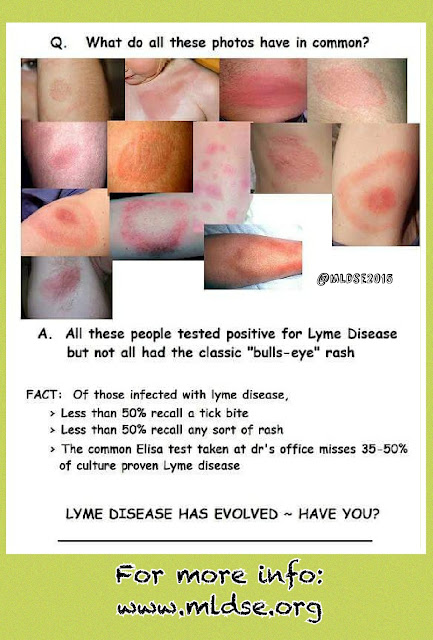HELP! I've Been Bit by a Tick! Now What?
Author: Paula Jackson Jones
Orig Published: 07/28/2017
This is the number one question that I get on a regular
basis, via phone call, email and in person. People who have had a tick
encounter struggle to find the next step.
It’s easy to become overwhelmed and disoriented by all the information
you find on the internet, which is why when people reach out to me, I give them
options. Bringing down the fear factor
is my main concern and giving people options gives them back control over their
own health concerns, a potentially unnerving situation.
The most common advice I give:
1) If you still have the tick, get it tested! Know what
you’ve been exposed to. Without symptoms, if you test too soon and your body
has not begun to produce antibodies, testing can be unreliable, give a false
negative. And many providers will not treat with antibiotics without symptoms.
2) While you wait, boost your immune system. There are
lots of homeopathic remedies that are safe and available in your local natural
food store that can boost your immune system and help draw out infection. Ledum is a natural, homeopathic remedy and a highly effective defense against
tick-borne diseases from a tick bite. It’s safe for all animals (dogs, cats,
horses, etc.) and people – it’s all natural with zero side effects. Used in conjunction with Bentonite clay made into a paste
and applied to the tick bite, this draws out any surface infection before it
can disseminate. You want to do this as
soon as you can after a tick bite.
3) If you want to see a Lyme literate
provider, contact us. It’s that simple. We are networked with medical providers all throughout the
state of Maine, who are well educated and experienced in the diagnosis and
treatment of tick-born disease.
It’s entirely up to you.
The 2018 CDC Health
Information for International Travel (commonly called the Yellow Book) is published every
two years as a reference for health professionals providing care to
international travelers and is a useful resource for anyone interested in
staying healthy abroad. In Chapter 3 (Infectious Diseases Related to
Travel), Dr Paul Mead, MD, Chief of Epidemiology and
Surveillance Activity of the Bacterial Diseases Branch of the Centers for
Disease Control and Prevention talks about contracting Lyme, how it manifests
itself and what treatment and prevention looks like. He further states that diagnosis and management are sometimes
controversial and should be managed by those who have experience with this
disease. That is because seeing a
medical provider who understands the complexity of tick-borne disease
understands that Lyme is a clinical diagnosis, that the current testing is
unreliable, that it can present in many ways and that a quick response is
needed before infection disseminates.
Once your tick test comes
back and you know what you’re dealing with, I encourage people to get with a
medical provider who is expertly trained and has a lot of experience with
patient’s exposed to tick-borne diseases. You want a medical provider who is up-to-speed
on the latest treatment guidelines and who has access to many forms of
treatment support. When infection is caught early, many times a single round of
treatment is all it takes.
So, if you’ve been bitten by
a tick and need support and direction, please contact us. We have support resources available for every
step of your journey back to health and wellness. For more information, you can
email info@mldse.org or visit our website www.mldse.org
[ Paula
is the President of Midcoast Lyme Disease Support & Education, a nonprofit
501c3 and Maine-partner of the Natl Lyme Disease Assoc and member of Maine CDC
Vector-borne Workgroup. She is also a
survivor of late stage neurological Lyme complicated by co-infections. You can
reach her at paula@mldse.org ]






Comments
Post a Comment